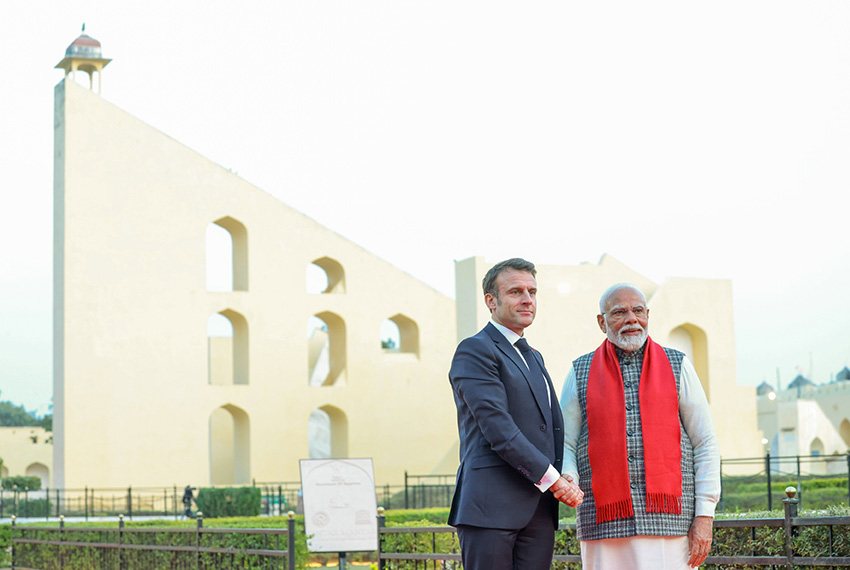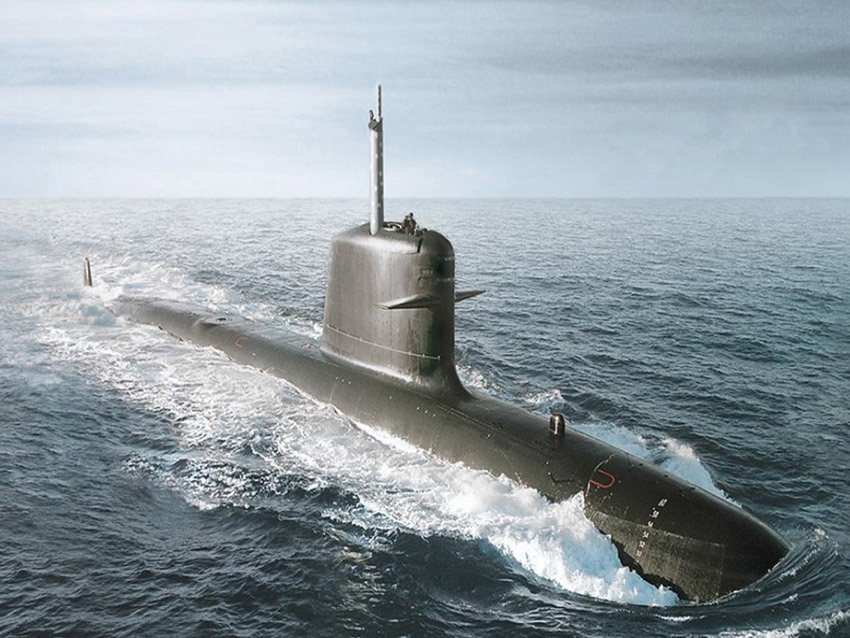India and France sign Defence Space Agreement to launch Military Satellites
By R. Anil Kumar
-
India and France have decided to deepen their Indo-Pacific security, defence, and space ties, with deals ranging from military-industrial cooperation to boost the exports, jointly building a helicopter engine, constructing additional conventional submarines, and joint satellite launches in the foreseeable future.
-
The main focus of French President Emmanuel Macron’s visit, coming as it does for the second time in six months after he visited New Delhi for the G20 summit hosted under India’s presidency in September 2023, was to ramp up the gains the two nations have achieved in the last few years in critical sectors.
-
Macron and Modi recognized the defence and security partnership as the principal pillar of the two nations’ ties and as a source of strengthening their respective country’s sovereignty and strategic autonomy and advancing peace in the Indo-Pacific region.
Bangalore, January 28.
Joint Satellite Launches Soon
India and France are already cooperating in the Space sector, with each other’s satellites being launched by their respective space agencies.

This Space sector relationship has lasted for six decades, and the two nations established the Strategic Space Dialogue in June 2023 to take their cooperation a notch higher by providing strategic guidance and direction across all aspects of space cooperation.
India and France committed this time to further expanding space cooperation for “the benefit of their countries, humanity, and the planet, including through co-development, manufacture and launch of satellites and payloads, research in new launch vehicle technologies and reusable launch vehicles and connecting the startups and users in both countries.”
During this meeting, India’s NewSpace and France’s Arianespace decided to build a long-term partnership on satellite launch missions and signed the Letter of Intent on Defence Space Cooperation.
Meanwhile, India and France have signed an ambitious and unprecedented Defence Space Agreement that could see the two countries launch military satellites with both offensive and defensive capabilities, people familiar with the matter said.
The deal, not publicised or spoken of, was quietly signed by French Defence Minister Sebastien Locornu and India’s National Security Advisor Ajit Doval on January 26, even as French President Emmanuel Macron was attending the “At Home” Republic Day reception at Rashtrapati Bhawan along with Prime Minister Narendra Modi.
The Letter of Intent (LoI) on the Defence Space Partnership signed between the two countries opens the door for the two allies to partner in the area of space defence and to together build defence capacities and operational capabilities for better global situational awareness, protection of communication and surveillance satellites, and making the battle-field more transparent in air, land and sea.
The LoI paves the way for the space agencies of the two countries to jointly develop and launch military satellites to protect national security interests. The military satellites will not only protect the space assets of India in the worst-case scenario but also track the moves of adversaries.
President Macron conveyed to his Indian interlocutors that there are “no limits” to French support to India in defence including designing, developing, manufacturing and certification of new platforms that will be specifically built to suit the requirements of the two countries.
It is understood that “India and France have decided to invest in a long-term relationship with the two countries on the same page politically on Houthis, and the Gaza war, with nuanced difference over the Ukraine war given that France is part of the EU,” said a top interlocutor.
During the French President’s two-day visit to India, PM Modi laid out the red carpet for Macron with External Affairs Minister S. Jaishankar accompanying him everywhere, from arrival to departure.
It is learnt that after the Jaipur roadshow, President Macron was amazed to find growing pro-incumbency for PM Modi even after a decade at the helm.
With the global situation volatile — in an arc from Morocco to Iran due to the Gaza war and in South East Asia due to the hegemony of China — India and France have decided to support each other, based on independent foreign policy and strategic autonomy.
France has also activated a five-year Schengen visa scheme for Indian youth to get access to the best of skills in French universities.
France is willing to support India in developing top-of-the-line defence platforms such as fighter aircraft engines, nuclear attack submarines and underwater drones, all locally made, and the defence industrial roadmap announced by the two leaders will not only make India self-reliant for the long term but also build an industrial base in the country.
This will create jobs and reduce India’s dependency on foreign imports. The two countries have also decided to manufacture in India and export to third countries.
President Macron made it clear to his accompanying Foreign, Defence and Cultures Ministers that there should be no hurdles in India-France ties and that India should be allowed access to all top-of-the line French technologies without any prejudice or reservations.
Indo-Pacific Security Focus to Counter China’s Expansionism
In a joint statement released after their bilateral meetings, the two leaders reiterated their commitment to further deepen the long-standing partnership between the two countries based on their shared vision for the Indo-Pacific region. The leaders emphasized the region’s significance for their respective sovereign and strategic interests.
They also acknowledged “the crucial role of their partnership in the region for advancing a free, open, inclusive, secure, and peaceful Indo-Pacific and beyond,” an euphemism for countering the aggressive, expansionist plans of Communist China.
India and France signed a Comprehensive Roadmap in July 2023 to boost their engagement in the Indo-Pacific region against China, which is a pain for Indo-Pacific nations with its territorial claims.
China has inflicted military conflicts not only with India but also with other nations, such as the Philippines, with which it has behaved aggressively in recent times over claims to the Second Thomas Shoal.
India’s ties with France extend from intelligence and information exchange to military exercises and defence equipment purchases across all domains from the seabed to space.
In their latest meeting after the two nations’ Maritime Cooperation Dialogue held in October 2023, Modi and Macron recognized the increasing complexity and interoperability of India-France joint defence exercises across air, sea, and land.
They agreed to consider a distinct joint tri-services exercise. They also discussed actively increasing capacities, particularly in the maritime domain, by joining hands with other like-minded countries.
Defence-Industrial Cooperation to Boost India’s Arms Exports
The two leaders also committed to further deepening the integration between the two countries’ respective defence industrial sectors and “to work together to identify opportunities for co-design, co-development, and co-production with the objective of not only fulfilling the defence needs of the Indian armed forces but also of providing a viable and reliable source of arms supplies to other friendly countries.”
The aim is to boost India’s defence industrial capabilities and capacities to meet its target of US$25 billion in military production and US$5 billion in arms exports by 2025.
The defence industrial collaboration, especially from the design stage, not only creates quality jobs for the youth and advances Modi’s vision of a ‘Self-Reliant India’ but also supports broader progress in scientific, technological, digital, and material sciences fields to realize the vision of ‘Developed India’ for 2047.
Towards this end, India and France adopted the ambitious Defence Industrial Roadmap during the present meeting between Modi and Macron. The details of this roadmap are yet to be released.
There are indications that this could cover areas such as cooperation in developing a combat jet aero-engine between France’s Safran and India’s Defence Research and Development Organization (DRDO), setting up Maintenance-Repair-Overhaul facilities for the civil LEAP aero-engines and Rafale combat jet aero-engines.
Airbus, Tata Tie-Up for Civilian Helicopters
The two leaders also announced Airbus’s decision to partner with Tata Advanced System to begin the assembly of single-engine H125 civilian helicopters in India. The two companies will become the first private sector companies to produce helicopters in India, in line with the Indian government’s strategy of self-reliance.
Airbus has decided to give growing orders for aircraft parts in India for its European assembly plants. The Final Assembly Line for H125s will be ready in 24 months after the two companies decide on the location, and the India-made helicopters will roll out from 2026.

Interestingly, Airbus and Tata are already in partnership to build the C295 military cargo aircraft in India, with 40 of the 56 aircraft on order from the Indian Air Force to be made at a Final Assembly Line (FAL) in Vadodara in Gujarat, Modi’s home province.
“The first 16 C295s of the 56 aircraft on order will be assembled at the San Pablo Sur site in Seville, Spain, with the second aircraft due to be delivered in May 2024 and the next 14 rolled out at a rate of one per month until August 2025,” Airbus had stated in September 2023 when the first of the C295s were delivered to India.
The production of these aircraft components has already started in the Main Constituent Assembly (MCA) facility in Hyderabad, India. These parts will be shipped to the Vadodara FAL, which is expected to be operational by November 2024.
The first ‘Make in India’ C295 will roll out of the Vadodara FAL in September 2026, a milestone for the Indian aerospace industry; the final aircraft is expected to be delivered to the IAF by August 2031.
Scorpene Submarine Localization Plan
The two sides also announced a comprehensive helicopter partnership with a Joint Venture for an Indian Multi-Role Helicopter engine between Hindustan Aeronautics Limited (HAL) and Safran, apart from localization of the Scorpene submarines being constructed in India, including indigenization.

In July 2023, when Modi was in France, the two nations announced the construction of three additional Scorpene submarines by the Mumbai-based Mazagon Dock and Shipbuilders Limited (MDL). Still, they removed it from the joint statement then.
This year’s joint statement mentions only Scorpene localization by India. Still, it doesn’t refer to the three additional Scorpenes submarines to be built, over and above the six that MDL is already building with help from France’s Naval Group.
India and France are already discussing an arrangement or a Memorandum of Understanding between each nation’s defence research agencies — DRDO and Directorate General of Armament (DGA), respectively — for cooperation. The two leaders expressed their intent to conclude this agreement in an early timeframe.





